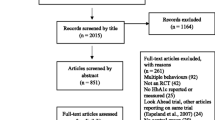Abstract
Most weight loss interventions for obesity-related risks 11 exclude people with serious mental health conditions. Our goal was to adapt a successful lifestyle/weight loss intervention for this population, deliver it in mental health clinics, and concurrently measure implementation factors. Developmental and implementation-focused formative evaluations guided adaptations and identified barriers/facilitators to successful program deployment. Adaptations included content specific to the population's needs, consciousness-raising among clinicians and patients, additional case management, and greater program flexibility. Barriers included instability in both settings from different sources. Facilitators included familiarity with groups, manual integrity, and appreciation of the program. It was delivered consistently across settings with maximum exposure and fairly good fidelity to the protocol (mean rating = 1.7, 2.0 = complete fidelity). This mixed-method implementation evaluation demonstrated that lifestyle/weight loss interventions in mental health settings are complex, but feasible, and valued by participants. Main program outcomes will be reported at the trial's conclusion.
Similar content being viewed by others
References
Strassnig, M., Brar, J. S., & Ganguli, R. (2003). Body mass index and quality of life in community-dwelling patients with schizophrenia. Schizophr Res, 62(1–2), 73–76.
McElroy SL, Kotwal R, Malhotra S, Nelson EB, Keck PE, Nemeroff CB. (2004). Are mood disorders and obesity related? A review for the mental health professional. J Clin Psychiatry, 65(5):634–651 (quiz 730; Review; 237 refs)
Virk, S., Schwartz, T. L., Jindal, S., Nihalani, N., & Jones, N. (2004). Psychiatric medication induced obesity: An aetiologic review. Obes Rev, 5(3), 167–170.
Thakore, J. H. (2004). Metabolic disturbance in first-episode schizophrenia. Br J Psychiatry Suppl, 47, S76–S79.
Allison, D. B., Newcomer, J. W., Dunn, A. L., et al. (2009). Obesity among those with mental disorders: A National Institute of Mental Health meeting report. Am J Prev Med, 36(4), 341–350.
Appel, L. J., Champagne, C. M., Harsha, D. W., et al. (2003). Effects of comprehensive lifestyle modification on blood pressure control: Main results of the PREMIER clinical trial. JAMA, 289(16), 2083–2093.
Loh, C., Meyer, J. M., & Leckband, S. G. (2006). A comprehensive review of behavioral interventions for weight management in schizophrenia. Ann Clin Psychiatry, 18(1), 23–31.
Funk, K. L., Elmer, P. J., Stevens, V. J., et al. (2006). PREMIER—A trial of lifestyle interventions for blood pressure control: intervention design and rationale. Health Promot Pract, 9(3), 271–280.
Expert Panel on Detection, Evaluation, and Treatment of High Blood Cholesterol in Adults (Adult Treatment Panel III). (2001). Executive summary of the third report of the National Cholesterol Education Program (NCEP). JAMA, 285(19), 2486–2497.
National Institutes of Health. (1997). The sixth report of the Joint National Committee on prevention, detection, evaluation, and treatment of high blood pressure. Arch Intern Med, 157(21), 2413–2446.
NHLBI Obesity Education Initiative Expert Panel. (1998). Clinical guidelines on the identification, evaluation, and treatment of overweight and obesity in adults: The evidence report. Report No. NIH Publication 98-40883
Ard, J. D., Grambow, S. C., Liu, D., Slentz, C. A., Kraus, W. E., & Svetkey, L. P. (2004). The effect of the PREMIER interventions on insulin sensitivity. Diabetes Care, 27(2), 340–347.
Azadbakht, L., Mirmiran, P., Esmaillzadeh, A., Azizi, T., & Azizi, F. (2005). Beneficial effects of a dietary approaches to stop hypertension eating plan on features of the metabolic syndrome. Diabetes Care, 28(12), 2823–2831.
National Institutes of Health. (1998). Clinical guidelines on the identification, evaluation, and treatment of overweight and obesity in adults: The executive summary. Report No. NIH Publication 98-40883
Gardner, H. (1983). Frames of mind. New York: Basic Book Inc.
National Institutes of Health. (2005). National Institutes of Health State of the Science Conference statement on Manifestations and Management of Chronic Insomnia in Adults, June 13–15, 2005. Sleep, 28(9), 1049–1057.
Perlis, M. L., Smith, L. J., Lyness, J. M., et al. (2006). Insomnia as a risk factor for onset of depression in the elderly. Behav Sleep Med, 4(2), 104–113.
Morselli, L., Leproult, R., Balbo, M., & Spiegel, K. (2010). Role of sleep duration in the regulation of glucose metabolism and appetite. Best Pract Res Clin Endocrinol Metab, 24(5), 687–702.
Saleebey, D. (1996). The strengths perspective in social work practice: Extensions and cautions. Soc Work, 41(3), 296–305.
Green, C. A., Polen, M. R., Janoff, S. L., et al. (2008). Understanding how clinician-patient relationships and relational continuity of care affect recovery from serious mental illness: STARS study results. Psychiatr Rehabil J, 32(1), 9–22.
Acknowledgments
This research was supported by a grant from the National Institute of Diabetes and Digestive and Kidney Diseases (Reducing Weight and Diabetes Risk in an Underserved Population 1R18DK076775-01A2). The authors would like to thank Laurie Lockert, Mark Lewinsohn, Jonathan Betlinski, Kevin Mahon, and Jon Emerson for their collaboration on the project as well as interventionists Chris Catlin, Micah Yarborough, Nina Scott, Kristoffer Lindstrom, and Jennifer Ferguson for their contributions to this important work.
Author information
Authors and Affiliations
Corresponding author
Additional information
Implications
Practice: Overweight and obesity are among the leading causes of preventable deaths in the US, and individuals with serious mental illness, particularly those taking antipsychotic medications, represent a large underserved population at greatly increased risk of obesity, diabetes, metabolic syndrome, and subsequent early mortality.
Policy: Common misconceptions regarding the limitations of patients with serious mental illness present substantial barriers to these individuals receiving adequate health care and increasing awareness among clinicians, health services organizations, policy makers and the public is critical.
Research: This report demonstrates that an intensive and fairly complex, multicomponent lifestyle intervention can be delivered to high needs patients and implemented within the context of real-world health delivery systems—this is highly relevant to translational research.
About this article
Cite this article
Yarborough, B.J.H., Janoff, S.L., Stevens, V.J. et al. Delivering a lifestyle and weight loss intervention to individuals in real-world mental health settings: lessons and opportunities. Behav. Med. Pract. Policy Res. 1, 406–415 (2011). https://doi.org/10.1007/s13142-011-0056-9
Published:
Issue Date:
DOI: https://doi.org/10.1007/s13142-011-0056-9




